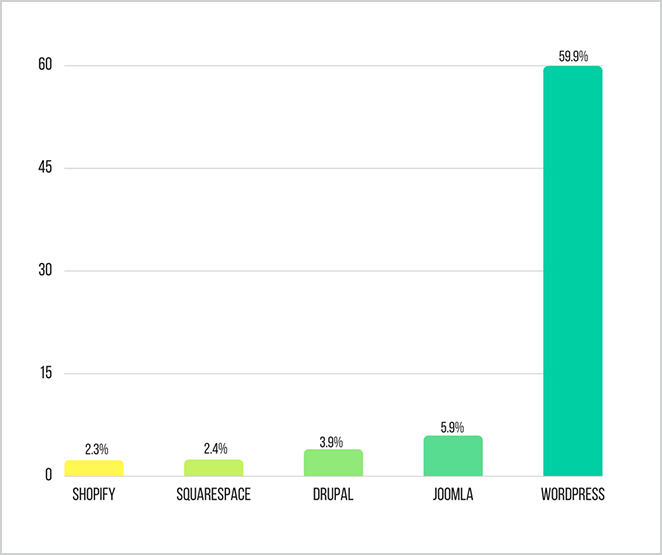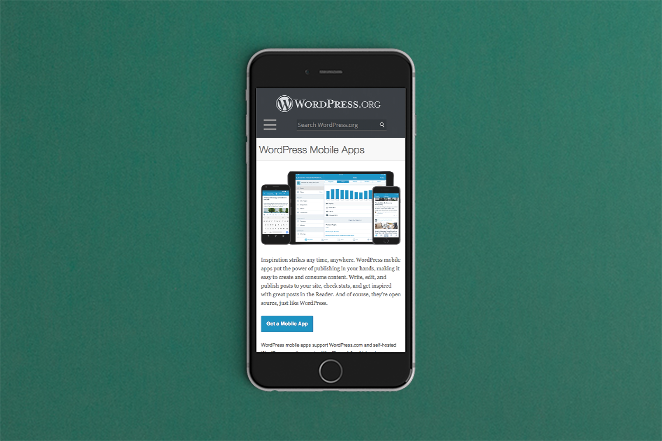
Did you know that WordPress powers 30% of all websites? That’s a pretty big percentage, and if you’re not on WordPress yet, you’re probably wondering, “Why?”
WordPress used to be a blogging platform, but it’s adapted well over the years and become extremely versatile, allowing users to create fully functional sites of any category. It’s also an open source software, meaning it’s completely free, redistributable, and offers unlimited validity.
Beyond the basics of what WordPress is, however, there are several features that make it great to build your website on (and totally explain why 30% of the internet is using it!).
1. Built-in SEO boosts
A lot of website traffic comes from people using search engines, such as Google, Yahoo, and Bing! The rankings on search engine result pages can bring thousands of users to a website daily. That’s where website owners play a game of tug-of-war between each other for traffic, and are concerned with SEO (Search Engine Optimization). This plays a very crucial role in attracting new users. Google and other search engines have a few predefined parameters which help them rank sites. And WordPress handles those parameters effectively.
WordPress, from the get-go, gives you an advantage with SEO, especially in regards to on-page optimizations. It takes care of many crucial cornerstone elements of a website, such as:
- Precise HTML markup. HTML markup helps search engines understand the website’s layout and content formats more easily. And some of the latest HTML5 WordPress themes make it even more compelling for users, as well as the crawlers from these search engines.
- Content creation efficiency. Content has become the ideal solution to present your website to search engines. With WordPress’ history with blogging, it’s made the platform more user-friendly for content creators, ranging from blogging, media, news, and loads more.
- SEO-beneficial permalinks. Permalinks, which stands for Permanent Links, are best utilized when they contain keywords related to your content, and WordPress makes it easy to customize them. For example, “https://getflywheel.com/layout/best-cms-wordpress-2020” is a lot more beneficial to users and search engines than “https://getflywheel.com/layout/?p3-1”.
- Image optimization. Images are crucial for your website and WordPress made sure to do their best with images as well. The built-in editor allows you to optimize images with alt tags, descriptions, captions, and further trimming.
These are just a few of the features that make WordPress special from its core. But on top of all this, there are even more you can add to it and revamp the whole CMS for your needs.
2. It’s easy to customize (even if you’re not a developer)
WordPress powers millions of sites around the world. But does that mean everyone building them is a trained developer? Not really. That’s due to the platform’s simple user interface, easy-to-understand options, and the functionalities present in it’s dashboard. It can effectively be used by anyone with zero coding knowledge, thanks to its power-packed WordPress themes, plugins, and tools. These help anyone create beautiful, dynamic websites.
Managing the site is even easier once it’s done and live. WordPress constantly rolls out updates for themes, better tools, and new plugins that you can install with a single click of a mouse.
layout by flywheel why wordpress is the best cms graph of wordpress and cms users percentage known
WordPress is used by 59.9% of all websites whose content management system we know. This is 31.4% of all websites.

With competitors like Joomla and Drupal lagging behind WordPress with 5.9% and 3.9% respectively, it shows how much of a conqueror WordPress is compared to others.
There are plenty of WordPress themes and plugins
WordPress comes packed with pre-built themes, plus designers and developers come up with new themes each and every day. The increased functionality and SEO optimization make each site dynamic and user-friendly through desktops, smartphones, and other devices. With all these choices, you can make your site look however you want. You can even find themes based on your needs or categories, like eCommerce, portfolio, blog, business, you name it.
Just like the heaps of themes WordPress offers, the platform also provides plugins for all your needs, which is another reason so many people find WordPress appealing.
Plugins are an easy way to add additional functionality to a WordPress site. Some of the most popular ones include Yoast SEO, Jetpack, W3 Total Cache, WooCommerce, Google XML sitemap, Google Analytics, and more.
The developers behind these plugins are usually pretty active, as well, and release updates on a regular basis. These updates can give your site even more functionality, keep it up-to-date, and increase performance.
It’s true that most of the plugins would come in handy and would increase the functionality of the website. But sometimes, it gets snappy and wears down the site. To make sure it doesn’t happen, WordPress also gives you an option to disable or deactivate the plugins you’ve installed in the core any time you need, helping you to keep your site optimal at all times.
Free vs. premium WordPress themes & plugins
The amount of themes and plugins available for WordPress is immense. There are literally thousands of options to use on your site. For plugins, you can download some from the WordPress.org Plugin Directory. But, here’s the catch: there are a fair number of premium plugins for you to use, as well, and these aren’t found in that directory.
What’s the big difference between the two?
For starters, premium plugins are not free. They also usually offer full-time customer support, better security, and increased compatibility with the latest versions of WordPress. You might not need customer support very often, but it’s sure nice to have when you have questions about the plugin and your particular site setup.
Premium plugins also offer more features than free plugins. You won’t always need the additional functionality to achieve your goals, but it’s nice to know there are even more robust options out there if the free versions aren’t getting the job done.
WordPress themes also operate in this same style. There are a plethora of free options built into WordPress, but you can also find premium themes from a wide variety of developers and these companies. The premium options tend to have more customizable options built-in, some “trendier” designs, and again, customer support.
This wide variety is exactly why so many people love using WordPress. For technical developers, you can use advanced themes or plugins (or even create your own). For beginners, there are plenty of easy-to-use options to help you get started. And no matter your skill level, there are other users using the same tools for their sites, so you’re joining a community that can help you troubleshoot.
3. Mobile optimization

With every passing year, there are more and more users actively visiting websites through their hand-held devices, but many sites still aren’t optimized for different screen ratios and fast-paced loading. Luckily, between some built-in WordPress functionality and most WordPress themes, your site will be packed with mobile features right off the bat.
From site design to image scaling, as long as you have a responsive WordPress theme, most of these important features will just naturally happen – no extra coding required. This will help both users and search engines access your site on all devices, leading to a great user experience no matter the screen size.
Google also prioritizes mobile experience for their ranking criteria, so if you want your site to show up in mobile search results, this is incredibly important to think about.
Between WordPress themes and plugins, it’s outrageously easy to create a mobile-friendly website. It’s no wonder 30% of websites use it!
4. WordPress security
Despite how many websites around the world are created with WordPress, they maintain a high level of security. Of course, there are always loopholes hackers could exploit (this is true of any CMS), but WordPress regularly releases security updates to protect your site from any vulnerabilities. And as a website owner, getting hacked is about the last thing you ever want to worry about.
By regularly updating your WordPress site and using themes and plugins that you trust, you can greatly minimize security risks. Add a managed WordPress host like Flywheel on top of that, and you’re looking at a super secure website.
5. Integrate with other software tools
If you’re building a website, you probably have a goal – maybe it’s simply to showcase your work online, generate leads for your business, or streamline information for your users. No matter the goal, you’re probably using a few other apps to achieve them, like social media platforms, email marketing tools, or analytics applications.
WordPress is such a popular platform that many of the other online tools you use will have an integration for it. Whether it connects via an API or a plugin, the process to connect these tools in your workflow is super simple.
6. The WordPress community keeps growing
As the numbers suggested earlier, of sites with a known CMS, nearly 60% are using WordPress. The WordPress community can’t be rivaled anytime soon, and it’s only continuing to grow. With new SEO features, improved dashboard functionality, and UI updates coming in the future, the platform is only getting better and better.
“It’s a no-brainer that you should use WordPress as your CMS in 2020 (and beyond!). ”
What do you say, are you convinced? Why are you skeptical of WordPress? Or if you’re already using it, why do you love? Let me know in the comments below; let’s build a better community.